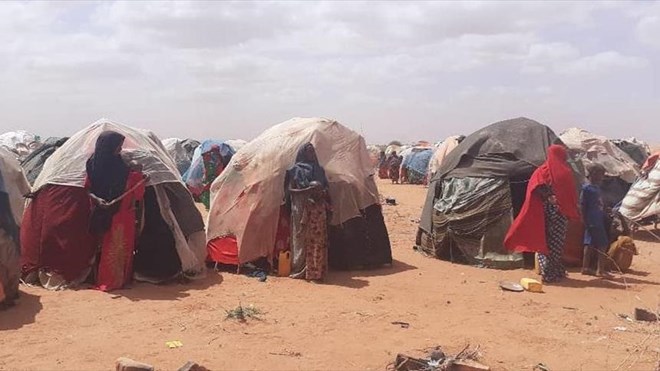
Friday November 18, 2022
By Mohammed Dhaysane
More than 6.7M 'on the brink of starvation' as Somalia faces one of its worst droughts in 40 years
MOGADISHU, Somalia An ongoing blockade by al-Shabaab insurgents in parts of Somalia is worsening the humanitarian situation in the Horn of Africa country.
Bakool in southwestern Somalia is one of the worst drought-affected regions. It has been under an al-Shabaab blockade for more than a decade, with the only means of reaching people in need of humanitarian assistance being by air or using donkey carts to transport food.
Adam Ali, a 38-year-old businessman and father of eight who is currently in the capital Mogadishu, told Anadolu Agency that the people in the region are in dire condition.
advertisements
The blockade is worsening and families have been suffering under a devastating drought for the past four years, said Ali, adding that the drought is the worst he has ever seen.“I have a lot of family there, was born and raised there, and I know the situation. The people in the region are facing a double-edged sword – the drought and the al-Shabaab blockade,” he said.
“If the government in Mogadishu and the state government continue to ignore how bad the humanitarian restrictions and blockade are, a lot of people will die of hunger or drought-related illnesses and malnutrition,” he added.
Omar Atu, mayor of Bakool’s provincial capital Hudur, told Anadolu Agency that al-Shabaab terrorists last week torched more than four donkey carts carrying much-needed food supplies to the region.
The neighboring region of Gedo has also been affected by the al-Shabaab blockade and humanitarian restrictions.
Ali Yussuf Abdullahi, spokesperson for Gedo’s regional administration, told Anadolu Agency that although the situation there is different, they have seen al-Shabaab terrorists restricting humanitarian activities.
The terrorists also killed several engineers who were digging a water well in the region, he said.
He said the terror group’s main aim is to pressure the local population into abandoning their support for the government.
“The terrorist group is hurting people by stopping humanitarian aid from reaching the areas they control and imposing a blockade on government-controlled areas,” he said.
“Two months ago, the group killed 11 people who were engineers, including foreigners, just because they were building and digging a water well,” he added.
The Hiran region, which has seen an uprising after al-Shabaab terrorists destroyed water wells and burned vehicles carrying food supplies, has also been affected, although the government said it had liberated large parts of the region from the group.
Mahas District Commissioner Mumin Mohamed Halane told Anadolu Agency that Somalis are fed up with the al-Shabaab blockade and extortion tactics.
“We have liberated our areas, and wherever they are, people are getting the humanitarian assistance they need. We will continue fighting because we are fighting to save lives,” he said.
Overall humanitarian situation
Four seasons of below-average rainfall in Somalia have constrained the supply of locally grown food in markets across the country.
Estimates suggest that the rainy season in April-June and the off-season September-October harvest were both 50% below the long-term average, according to the UN.
Soaring food prices in the international market have also worsened the situation in the country.
A convergence of reduced local food supply and skyrocketing global food prices has resulted in record-high food prices in markets in Somalia.
Millions facing starvation
Currently, there are over 6.7 million people on the brink of starvation in the country, said Ishaku Mshelia, deputy emergency coordinator for the UN Food and Agriculture Organization (FAO) office in Somalia.
He said counterinsurgency operations, sieges by non-state actors around some towns, reprisal attacks, and threats of attacks are limiting humanitarian access in hard-to-reach areas.
“Although some areas such as Ceelbuur, Jamaame, Hudur, and Dinsoor are classified as hard-to-reach, the FAO was able to reach some vulnerable households with critically needed cash transfers in some of these districts,” he said.
He added that the worst drought in the last 40 years and elevated global food prices have pushed more than 6.7 million Somalis to the brink of starvation.
Humanitarian assistance has been scaled up in the past few months, but the number of people in need continues to outpace the level of assistance, he added.
Mshelia said the presence of non-state armed groups makes aid delivery a lot more challenging.
“Add to that the war in Ukraine, which caused a skyrocketing of global food prices. We face an unprecedented challenge in meeting the needs of Somalis at this critical moment,” he added.
Somalia declared the current drought a “national humanitarian emergency” in late 2021.
The UN also raised the alarm and said that famine will likely occur in parts of Somalia as the drought continues to worsen.